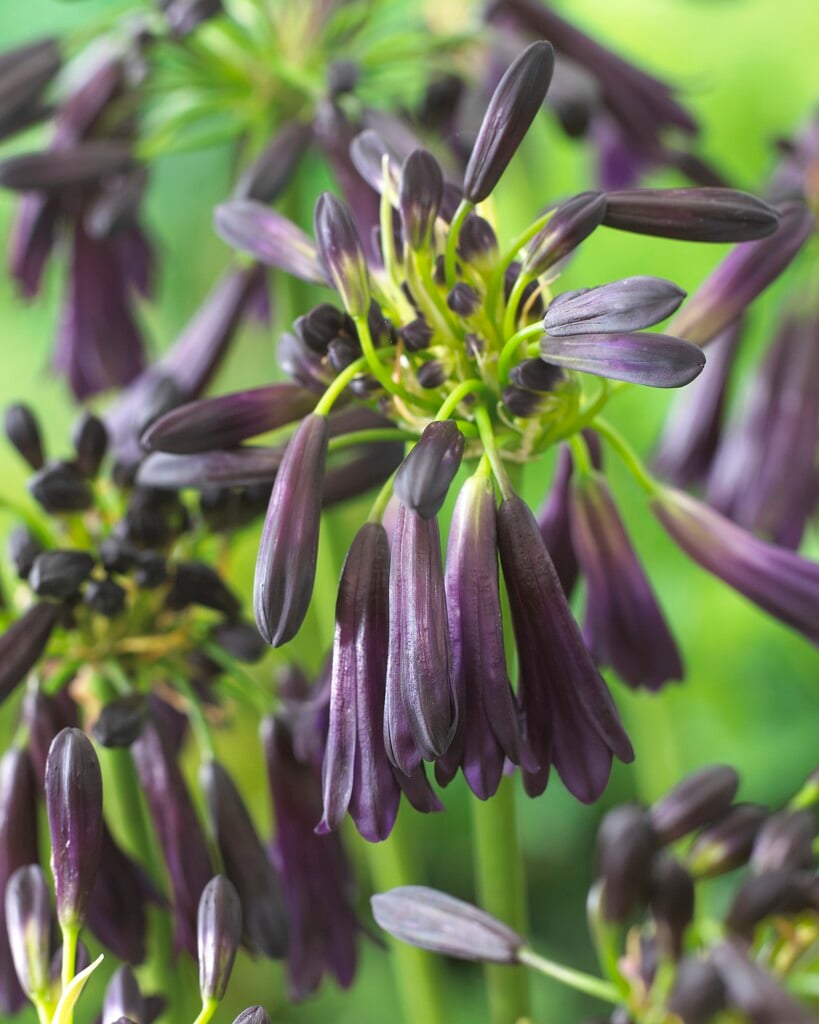Agapanthus inapertus 'Midnight Cascade'
closed African lily 'Midnight Cascade'
A clump-forming, deciduous, herbaceous perennial, producing narrow, strap-shaped, mid-green foliage, to a height of around 40cm (16in) and spreading to around 40cm (16in). Hemisperical heads of pendulous, funnel-shaped flowers in very deep purple, are produced in late summer, on straight, green stems, to approximately 80cm (32in) high.
Size
Ultimate height
0.5–1 metresTime to ultimate height
2–5 yearsUltimate spread
0.1–0.5 metresGrowing conditions
Moisture
Well–drainedpH
Acid, Alkaline, NeutralColour & scent
| Stem | Flower | Foliage | Fruit | |
| Spring | Green | |||
|---|---|---|---|---|
| Summer | Purple Black | Green | ||
| Autumn | Green | |||
| Winter |
Position
- Full sun
Aspect
South–facing or West–facing
Exposure
Sheltered Hardiness
H4Botanical details
- Family
- Amaryllidaceae
- Native to GB / Ireland
- No
- Foliage
- Deciduous
- Habit
- Clump forming
- Potentially harmful
- Al parts of the plant are harmful if eaten
- Genus
Agapanthus are clump-forming perennials with narrowly strap-shaped leaves, evergreen in some species, and erect stems bearing umbels of funnel-shaped blue or white flowers
- Name status
Unresolved
How to grow
Cultivation
Grow in a light, well-drained soil and a position in full sun for best flowering. Plants benefit from regular watering and feeding during the growing season April to September. Protect plants in cold areas against frost damage by wrapping with several layers of fleece. See agapanthus cultivation for more details
Propagation
Propagate by division in spring, or by seed, but bear in mind that seed-raised plants may not come true to the parent plant, where it is a hybrid cultivar
Suggested planting locations and garden types
- City and courtyard gardens
- Coastal
- Cottage and informal garden
- Gravel garden
- Mediterranean climate plants
- Patio and container plants
- Banks and slopes
- Cut flowers
- Flower borders and beds
- Wall side borders
Pruning
No pruning required other than to remove any dead foliage or spent flower heads
Pests
May be susceptible to slugs and snails and agapanthus gall midge
Diseases
May be susceptible to a virus
Get involved
The Royal Horticultural Society is the UK’s leading gardening charity. We aim to enrich everyone’s life through plants, and make the UK a greener and more beautiful place.
